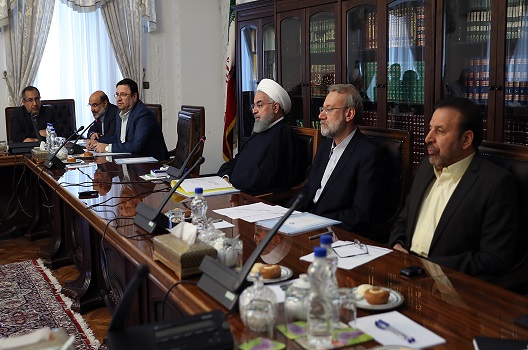 In the aftermath of the Trump administration’s decision to leave the Joint Comprehensive Plan of Action (JCPOA), Iranian hardliners have called on the government to also pull out and immediately accelerate Iran’s nuclear program.
In the aftermath of the Trump administration’s decision to leave the Joint Comprehensive Plan of Action (JCPOA), Iranian hardliners have called on the government to also pull out and immediately accelerate Iran’s nuclear program.
Kayhan, a newspaper that is considered the mouthpiece of Supreme Leader Ayatollah Ali Khamenei, and Javan, an outlet close to the Islamic Revolutionary Guard Corps, both said Iran should restart its nuclear project. “Trump has torn up the nuclear deal, it is time for us to burn it,” Kayhan wrote. IRGC Commander Maj. Gen. Mohammad Ali Jafari told Fars News that the US exit from the JCPOA was a “good omen” for Iran and called for boosting Iran’s defense capabilities. Some hardline analysts went as far to suggest that the IRGC should use the situation to stage a military coup.
This public posturing, however, belies a difficult domestic situation. Iran’s economy is in free fall. Iran’s currency has plummeted to its lowest level in history, causing an upheaval in Iran’s economy and panic among the population, which has been hoarding dollars. So far, the government has failed to stabilize the situation. When President Hassan Rouhani was inaugurated in in 2013, one dollar equaled 36,000 rials; today this figure stands near 75,000. The return of broader sanctions will put even more pressure on the economy.
Widespread protests erupted last December and continued into January after the Rouhani government leaked that it was allocating $8 billion in the annual budget for the IRGC. The disclosure prompted sharp criticism of Iran’s involvement in regional wars, including in Iraq, Syria, and Yemen. The riots, which cut across all social classes but were concentrated among blue collar workers in provincial cities and towns, were an indication of the shaky state of the regime’s legitimacy.
Public discontent has been exacerbated by drought and other environmental woes, provoking protests in regions populated by ethnic minorities such as the Arabs of Khuzistan and the Azeris of Azerbaijan where farmers have been forced off their land by water shortages.
Given these challenges, the Rouhani faction appears to have won a few weeks of grace to try to negotiate a separate deal with the European Union, Russia, and China that will keep Iran within the JCPOA. The Supreme Leader has acknowledged as much but expressed skepticism that the other JCPOA partners can satisfy Iran’s demands. However, even if Iran can reach a separate understanding with the other parties to the deal, the secondary sanctions that the US is re-imposing will force foreign firms to choose between doing business with the United States – with an $18 trillion a year economy — or Iran – whose annual GDP only slightly exceeds $400 billion.
Tehran insiders predict that in case of failure, the IRGC and other hardline factions will try to convince Khamenei to pull out of the JCPOA. But the hardliners would find themselves in the unenviable position of restarting the industrial scale fabrication of uranium amid a collapsing economy. To complicate matters, the Guards, and their foreign operations division, the Quds Force, have suffered humiliating setbacks at the hands of the Israel, including a failed attempt to use rockets against Israel’s forward positions in the Golan Heights. In response, the Israeli air force launched a devastating attack on Iranian military infrastructure in Syria. This raid, along with several similar attacks in the past few months, apparently wiped out the entire Iranian logistical investment in Syria.
Conversely, the regime could agree to renegotiate the deal to meet the American stipulation for “fixing” it. John Bolton, Trump’s national security adviser, implied that the United States would insist on stopping all uranium enrichment, curtailing Iran’s development and testing of ballistic missiles, terminating support for groups on the US terrorist list and stopping threats to destroy Israel. Such a cocktail of fixes may be too hard to swallow at present but more palatable if the regime faces a threat to its survival through economic collapse.
All of this assumes that the US can force other countries to abide by a restored sanctions regime, which is not guaranteed. China is expected to continue to import Iranian oil and back fill for European companies such as Total that choose to exit Iran rather than face possible US penalties.
Supporters of the deal, including the European countries, have warned that the American departure would strengthen Iran’s hardliners and prompt Iran to resume higher levels of uranium enrichment. Indeed, Rouhani announced that he had ordered the Atomic Energy Organization (AEOI) of Iran to look into accelerating uranium enrichment. Discussing the prospect one year ago, Ali Akbar Salehi, the head of the AEOI, stated that Iran had maintained the ability to resume full-scale enrichment of uranium. In his words, “If senior Islamic Republic officials issue an order to resume the 20 percent enrichment, we can do it in Fordo within four days.”
It remains to be seen if the other signatories of the JCPOA can produce a package of incentives sufficient to keep Iran in the agreement while Trump is president.
Farhad Rezaei is an Iran analyst in Ankara. He is the co-author of the forthcoming “Iran, Israel, and the United States: The Politics of Counter-Proliferation Intelligence,” Rowman and Littlefield.
Image: Supreme Council meeting in Tehran on May 14 (Source: president.ir)
